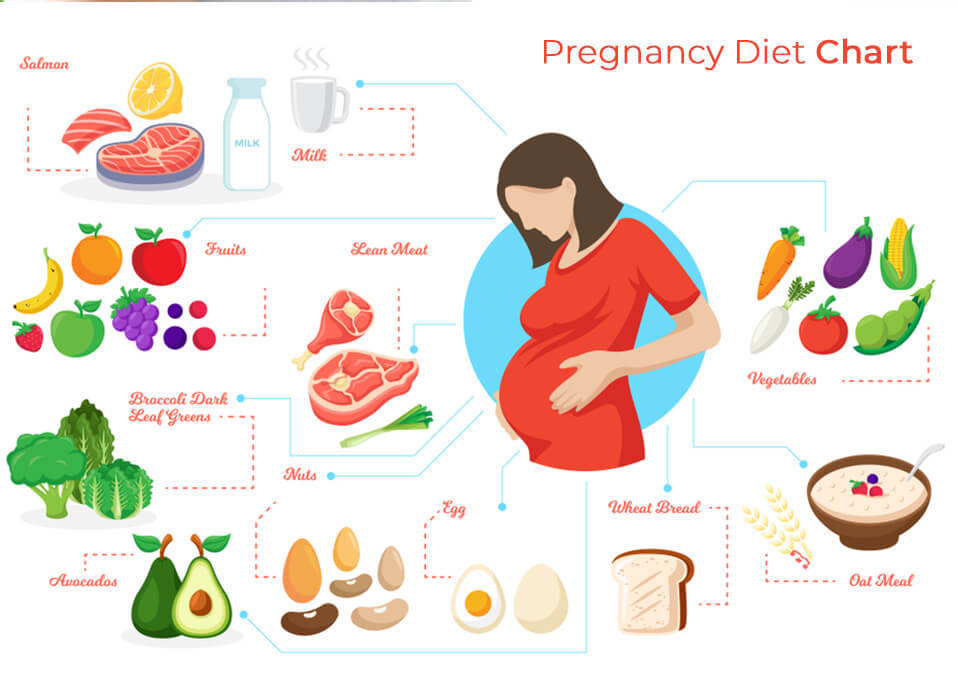Recent studies suggest that low-carbohydrate diets can increase the risk of birth defects. Is it because of the absence of carbohydrates, or is it something else? You can learn more about this, how many carbohydrates women will need during their pregnancy and how the mother’s diet affects the metabolism of the baby and his health till adulthood.
I am always overwhelmed by the latest concerns about media titles. Last month, a study was published in the journal Birth Defects Research entitled “A low-carbohydrate diet could increase the risk of neural tube defects”.

Women with low carbohydrate intake are more likely to have babies with neural tube defects than women who do not limit the carbohydrate intake.
The most important thing is the simplification of the author. We will be discussing the number of carbohydrates women will need during their pregnancy and other studies and researches that may give us a clue to have a clear idea about the intake of micronutrients during pregnancy and if it really affects the baby’s metabolism in life.
The research results
In the study that we talked about above, some investigators did analyze some data from the National Birth Defects Prevention for babies, which were made in 1999, saying that 1.760 babies are born with cases of anencephaly with a missing brain, or a part of the skull is missing, or a half case, in which the spinal cord is not fully closed, and 9.546 mothers control babies born without congenital disabilities.
Read : Plus Size Pregnancy, All You Need To Know
These are my doubts about this study.
This change is in the relative risk. The total risk of delivering babies with neural tube defects is specified with a Rate of 1 to 1,900, so that means that the change to the full risk is still low.
Carbohydrate consumption before pregnancy was estimated using a questionnaire on the frequency of food consumption. Self-reported food taken to the body is notoriously untrue and a big and significant problem in nutrition research.
For the most part, specialists conversed with ladies as long as nine months just after their due date and requested that they recall their eating routine a year before getting pregnant! Do you remember the number of carbohydrates you took in one year? I think I’m looking at my perspective.
The most outstanding thing was the assimilation of folic acid. Like what the writer says, our measurements of carbs and folic acid are not free from outside control because both of them come from the same diet.

The embryonic stage of neural tube process often happen before women realize they are pregnant.
The union between carbohydrate intake and NTD was watched distinctly in ladies who had an undesirable pregnancy. We believe that this is due to the fact that women who want to get pregnant change their diet positively or take folic acid regularly.
It is also suspected that this is due to folic acid deficiency and not to low carbohydrate intake.
The more instructive title of this investigation is: “a diminished folate consumption before pregnancy is, as indicated by its information, related to an expanded danger of neural cylinder absconds.
Ladies who have an unscheduled pregnancy and at the same time limit the carbohydrate intake may have an expanded risk of folate insufficiency in the future

What we know from the common traditional cultures
The study described in the previous section is not a good reason to avoid a low carbohydrate diet during pregnancy. Yet, still, there are such a large number of motivations to stay away from a low-carbohydrate diet during your pregnancy. Does it reduce your child’s health at birth or later in life? This is the question that I will be answering in this article. First of all, we are going to start by examining the main role of the carbohydrates in maternal health and all the practices of traditional pregnancy.
In many African tribes, there were special nutrition programs not only for Pregnant women but also during pregnancy and while breastfeeding.
As an example of the staggering knowledge of these crude clans, I discovered that they use during lactation two kinds of cereal with strange properties One of them was red millet which was not only rich in carotene but also a five to ten times higher calcium content than most other grains showed.
They are also used for nursing mothers in some African tribes. They’re called Linga-linga by the Indians of Peru, another grain was generously used called Quinoa, It is not rich in minerals only but it has also some strong properties that stimulate the flow of milk.
This implies, all these plants can help in growing a child even without having any carbohydrates, yet their fertility was not ideal except if they do some self-medication.
What do you think about this? Share your opinion with us.
Read also:
Eating Hot Dogs and Barbecues While Pregnant
How To Announce Pregnancy To Parents?
Pregnancy Hip Pain: How to Relieve and Prevent Hip Pain During Pregnancy
WOMEN STICK TOGETHER, SHARING IS CARING!








